Miscellaneous




extends the requirement for a certificate of merit in actions
extends the requirement for a certificate of merit in actions against engineers, architects and surveyors.
Provided non-medical Good Samaritans the same liability protections afforded medical
Allows a builder an opportunity to cure an alleged defect
In 1995, the Chief Justice of the California Supreme Court
In 1995, the Chief Justice of the California Supreme Court and the California Judicial Council, the research and policymaking body of the court system, established a Blue Ribbon Commission on jury reform. Several of the Commission’s recommendations involved universal service such as providing mandatory procedures for enforcing jury summonses, increasing juror fees, requiring all employers to continue paying usual compensation for the first three days of jury service, developing tax credits for employers continuing to pay employees during jury service, and providing a list of factors judges should use when making the “good cause” determination. The Judicial Council appears to have had limited success convincing the legislature to implement its recommendations. In 2002, California trial courts adopted a one-day/one-trial system to lessen the burden of service on jurors and the California Supreme Court amended California Rules of Court 701 to strengthen standards for hardship excuses.
Provided for the inadmissibility of certain evidence as a matter
Provided for the inadmissibility of certain evidence as a matter of public policy, including portions of statements, writings, or benevolent gestures expressing sympathy or a general sense of benevolence relating to the pain, suffering, or death of a person involved in an accident and made to that person or to the family of that person, which are inadmissible as evidence of an admission of liability in a civil action. The reform did not make admissions of fault inadmissible.
Notifications
